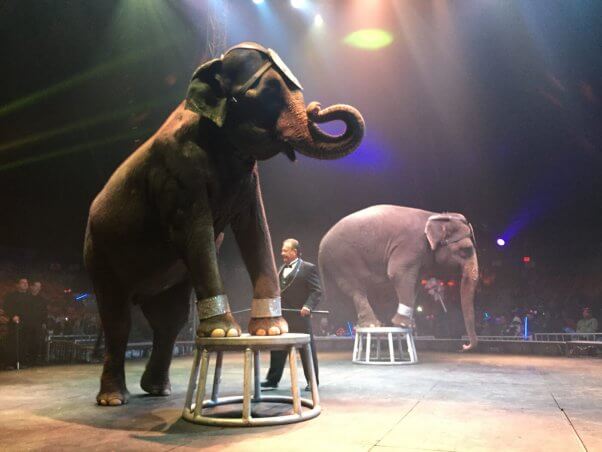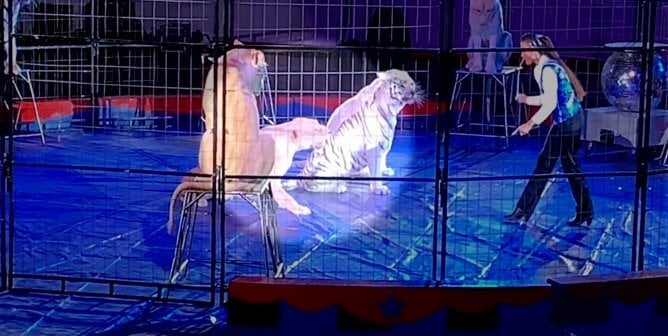Stopping By the Circus? PETA Lists Big-Top Hubs That Ban Wild-Animal Acts
Live-animal acts are cruel remnants of the past that all great performers have abandoned, and there’s no better proof of that than the reinvention of Ringling Bros. and Barnum & Bailey Circus to include only willing human participants. Elephants don’t stand on their heads and tigers don’t jump through rings of fire because they want to—they do it because they’re afraid of being beaten if they don’t. Kind people don’t want to watch humans bully animals. The public is calling for an end to this abuse, which is why there are protests against it everywhere and cities and states are banning animal circuses and other live-animal acts. The few circuses that persist in forcing animals to perform confusing and often painful tricks now have a choice: go animal-free or go out of business.
For years, PETA’s protests, action alerts, and support of law-enforcement efforts have helped pave the way for legislation to increase protections for animals exploited for entertainment. Keep reading for a list of localities that have passed restrictions or bans on the use of animals in circuses.

The following towns, cities, states, and countries represent just some of the places that have passed restrictions or bans on the use of certain wild animals in circuses or traveling shows.
These U.S. cities and counties have existing bans or restrictions on animal circuses and traveling wild-animal acts:
- Amherst, Cambridge, Topsfield, and Wilmington, Massachusetts
- Asheville and Charlotte, North Carolina
- Boise, Idaho
- Bridgepoint and Stamford, Connecticut
- Cincinnati, Ohio
- Dane County, Wisconsin
- Ferndale, Michigan
- Los Angeles, San Francisco, and West Hollywood, California
- Margate, Florida
- Missoula, Montana
- Multnomah County, Oregon
- New York City, Westchester, and Suffolk County, New York
- Portland, Maine
- Salt Lake County, Utah
- Santa Fe, New Mexico
- Wenatchee, Washington
These U.S. states have statewide bans on certain animal acts in circuses:
- California—Bans the use of all animals in circuses except domesticated dogs, cats, and horses
- Colorado—Bans the use of elephants, big cats, bears, and other animals in circuses and other traveling shows in the state
- Hawaii—Bans the importation of wild or exotic animals for circuses
- Illinois—Bans the use of elephants in traveling acts
- Kentucky—Prohibits circuses from using endangered species, including elephants and big cats, and bans dangerous exotic-animal shows from county and state fairs
- Maryland—Bans the use of elephants, big cats, bears, and primates in traveling acts
- Massachusetts—Bans the use of elephants, big cats, primates, giraffes, and bears in traveling acts
- New Jersey—With the passage of Nosey’s Law, became the first state to ban wild- or exotic-animal acts
- New York—Bans the use of elephants in traveling acts
These countries have restrictions or bans on animals in circuses and traveling shows:
- France has announced that it will phase out animal circuses.
- Latvia and Romania (with a push from PETA Germany)
- Mexico
- Scotland, England, Wales, and the Republic of Ireland (after hearing from PETA U.K.)
Fight Speciesism: Stay Far Away From Animal Acts, Attractions, or Encounters at Circuses and Traveling Shows
Animals are unwilling participants in circus acts and traveling shows. Denied every opportunity to engage in natural behavior vital to their mental and physical well-being, they’re forced to perform confusing and often painful tricks under the threat of punishment. If an event features dangerous hands-on encounters between humans and wild animals, don’t buy a ticket. Support performances and venues that rely solely on the talents of willing human performers, and encourage your friends and family members to do the same.




